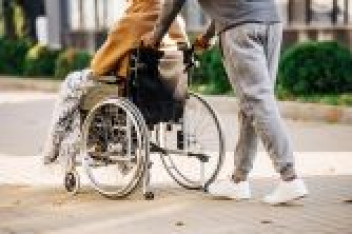On April 4, 2024, the Grand Chamber of the Supreme Court decided that since the entry into force of Law No. 1774-VIII, the minimum wage is not used as a calculation value for determining pension supplements for unemployed pensioners who live in the territory of radioactive contamination.
It is the subsistence minimum that should be applied
To summarize briefly, the court indicated that Law No. 1774-VIII was adopted later than Law No. 796, and therefore should be applied according to the new calculated values. For those who are currently litigating or plan to litigate in 2024, the court will likely award an additional payment of two living wages rather than minimum wages. As of today, it is approximately 3,000 hryvnias or 6,000 hryvnias depending on the area of residence. It is also important to emphasize that from January 1, 2024, in accordance with the Law of Ukraine "On the State Budget for 2024", a new amount of the minimum wage, which is used to enforce court decisions, has been established - 16,000 hryvnias.
How will this affect those who currently receive an additional payment in the amount of thirteen thousand four hundred hryvnias or more, that is, in the correct, let's say, minimum wages?
This decision does not affect those who condemned their Chernobyl pension earlier.
- There will be no mass recalculation and reduction of payments based on this decision.
- Currently, unfortunately, we are faced with the fact that in certain cases, if the pension fund receives relevant appeals from the state executor, any court rulings on the establishment of judicial control or any other documents related to the correctness of the calculation of additional payments to pensions for non-working pensioners, the pension fund reduces these amounts. For example, from thirteen thousand hryvnias to three thousand two hundred hryvnias, or in general there are cases when supplementary pension payments are stopped. In this case, it is a violation that needs to be fought for.
- If the surcharge has been completely removed, you need to appeal against the illegal actions of the pension fund by going to court to protect your rights.
Regarding the change from thirteen thousand hryvnias to three thousand two hundred hryvnias, at the moment it is difficult to say how it can be fixed or if it can be fixed at all, because they refer to a change in legislation. Accordingly, the law on the state budget is amended, and they operate within the limits of the changes made to this law. Here it is worth making sure that, if you have not yet finished enforcement proceedings, the state bailiff has not sent any appeals so that you do not have to reduce the amount of the surcharge.
Question
How will this affect those who currently receive an additional payment in the amount of three thousand two hundred hryvnias?
Respond
Most likely, this decision of the Grand Chamber will not affect this category of citizens either, because the court decision stipulates the fixed amount of wages as of January 1 of the calendar year. The estimated value is indicated as the minimum wage, not the living wage. Thus, the pension fund will be guided precisely by the fact that you have set the amount of the minimum wage, and payments will be made according to this amount. Changes will not be possible, unless the law on the state budget for the calendar year or the rules on the minimum wage to implement court decisions are changed next year.
Question
Is it possible to file a new lawsuit and ask to oblige the pension fund to make payments based on living wages instead of minimum wages?
Respond
The answer is ambiguous. On the one hand, if the dispute has already been resolved by the court, a repeated appeal between the same parties on the same issues is impossible according to our procedural legislation. On the other hand, there is no practical application, so it is theoretically possible.
Regarding those who have a court decision to pay additional payments in the amount of minimum wages, but this decision has not yet been executed or has not entered into force: if the court decision stipulates minimum wages, there is a possibility, that the pension fund will pay supplements based on the living wage, not minimum wages. However, it is impossible to say for sure at the moment, as these decisions are still in the process of being implemented, and we do not yet have written evidence or answers from the pension fund.
Thus, the question remains: will you receive three thousand two hundred hryvnias, or six thousand fifty eight hryvnias? The decision of the large chamber of the Supreme Court from the fourth of April affects different categories of citizens in different ways. For those who have already been sentenced to additional payments, there is one situation, and for those who are still waiting for legal proceedings, the right to the payment of a pension in the amount of two or three subsistence minimums will be fixed for them.
Legal assistance in social matters, in particular with Chernobyl surcharges
Social issues are often difficult to understand and solve without the help of a specialist. This especially applies to such areas as Chernobyl surcharges, subsidies for communal services, state payments and benefits for persons with disabilities. Lawyers who specialize in social issues help citizens deal with the preparation of documents, submission of applications and resolution of disputes with state bodies. Below is a look at how lawyers can be useful in the most common social issues.
- Subsidy. Registration of subsidies. Obtaining a subsidy is an important aspect of support for many families who are unable to cover utility costs on their own. There are usually many questions about the procedure, for example how to issue a subsidy or how to check its status. Lawyers can provide detailed advice on the subsidy assignment, help prepare the necessary documents, and also provide advice on how to check gas subsidy or other utility services. They can also help solve issues related to debts to housing and communal services, which can become an obstacle to receiving a subsidy.
- Benefits for persons with disabilities. Persons with disabilities are entitled to certain state benefits. However, citizens often do not know what benefits they are entitled to or how to apply for them. There are benefits for the disabled of different groups. For example, there are separate benefits for the disabled of group 2 and benefits for the disabled of group 3. Lawyers will help determine which benefits are available for a specific person, and advise on their registration. They can also represent the interests of disabled people in courts and state bodies in cases where benefits are not provided or are wrongfully denied.
- payment at the birth of a third child. The birth of a child is always accompanied by significant financial costs. The state provides certain payments to support families. For example, it is especially important to get the payment upon the birth of a third child right, as it may include additional financial benefits. Lawyers will help prepare all the necessary documents and make sure that the application is submitted correctly and on time.
Important social issues in which a lawyer will help
Our company offers services:
Consultations on the registration of subsidies and checking the status of subsidies.
Assistance in obtaining benefits for persons with disabilities, in particular benefits for disabled of group 2 and benefits for disabled persons of group 3.
Support in the registration of state payments upon the birth of a child, especially with the third child.
Solving issues with debts to housing and communal services and possible obstacles in the allocation of subsidies.
We also offer representation of interests in court and before state authorities in case of wrongful denial of social benefits or benefits.
Changes to the legislation regarding Chernobyl surcharges are constantly being made. The assistance of a lawyer in social matters is necessary for citizens who face difficulties in the field of public payments, subsidies or benefits. Thanks to professional support, it is possible to avoid errors in the preparation of documents, receive benefits and payments due by law, and resolve disputed issues with state institutions.































